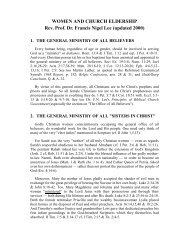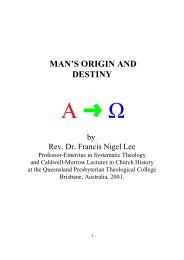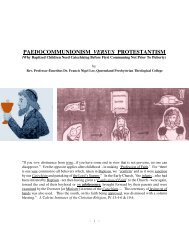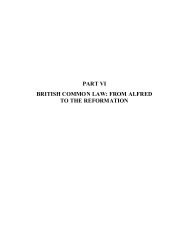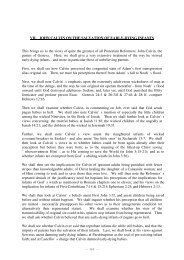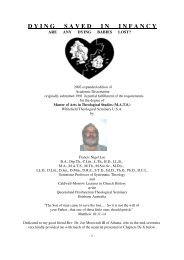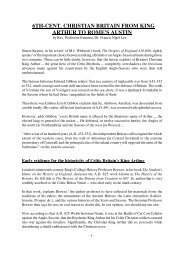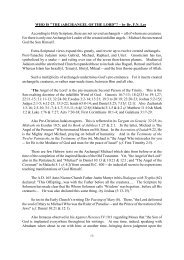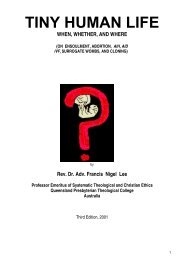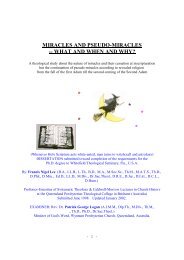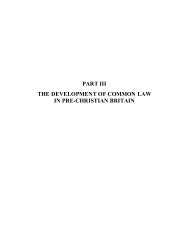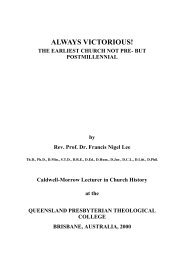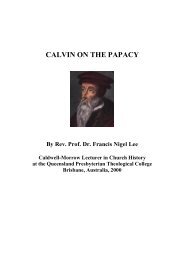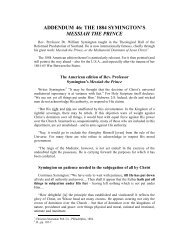THE CHRISTIAN AFRIKANERS - The Works of F. N. Lee
THE CHRISTIAN AFRIKANERS - The Works of F. N. Lee
THE CHRISTIAN AFRIKANERS - The Works of F. N. Lee
Create successful ePaper yourself
Turn your PDF publications into a flip-book with our unique Google optimized e-Paper software.
From 1900 to 1935, after the Anglo-Boer War, the White South Africans were defeated andeconomically ruined. A very massive amount <strong>of</strong> them became impoverished "Poor Whites" - withvery little to lose but their chains (as Karl Marx might have said about them, had he lived at thattime). But then, there was the establishment <strong>of</strong> the economic rehabilitation schemes such as Dr.John Kestell's Reddingsdaadbond.Yet later, the Broederbond was established by Afrikaners particularly to bring about the economicresurrection <strong>of</strong> the Afrikaner. So we find the development <strong>of</strong> large Afrikaner commercialenterprises such as Volkskas (the banking system) and Federale Mynbou (or Federal Mines) -- untilthe Afrikaner had more and more begun to achieve economic clout in his own land.One <strong>of</strong> the previous State Presidents, Dr. Diedrichs, taught Economics at the Orange Free StateUniversity and was also an authority against communism. He and Senator Horwood, the presentMinister <strong>of</strong> Finance and previously Rector <strong>of</strong> the University <strong>of</strong> Natal, have more and more beensteering South Africa away from the remnants <strong>of</strong> a certain amount <strong>of</strong> economic state socialism --and toward private enterprise. Today it may possibly be that South Africa is one <strong>of</strong> the freestcountries in the world as far as private enterprise is concerned -- and, in some areas at least, evenahead <strong>of</strong> the United States. For there has been a continuing socialisation <strong>of</strong> the American economy,particularly over the last seventy years, after a strong position <strong>of</strong> free enterprise previously.At any rate, there are only a handful <strong>of</strong> countries in the whole world that produce enough food t<strong>of</strong>eed themselves and to export to others. One, <strong>of</strong> course, is the United States; the second is Canada;and then (fascinatingly) the two desert countries, Australia and South Africa. After that, you haveto scratch your head to find countries that can feed themselves -- quite apart from those that havemassive agricultural exports!I think there is a direct relationship between historic Calvinism's influence on a nation's origin andits continued on one hand -- and its ability to produce and to keep on producing especially in thearea <strong>of</strong> agriculture on the other hand. Here Max Weber was right, and Karl Marx was wrong!But last, I must disclose that South Africa is also a mineralogical power -- perhaps the mostsupreme mineralogical power in the world. I am not here referring so much to South Africa'sproduction <strong>of</strong> gold (some 75% <strong>of</strong> the free world's supply); nor to her diamonds (90% <strong>of</strong> the freeworld's supply); nor to her platinum as a necessary ingredient <strong>of</strong> silencers on motor cars (some 95%<strong>of</strong> the world's supply); nor to her copper (a huge slice <strong>of</strong> the world's supply). But here I amreferring to far more crucial minerals than these!I am referring to those rare metals which are absolutely essential for the manufacture <strong>of</strong> steel. I amreferring to South Africa's chrome (up to 90% <strong>of</strong> the world's supply); to her cobalt (77% <strong>of</strong> theworld's supply); to antimony, to vanadium, to molybdenum, to manganese, and to other vitalingredients needed to manufacture steel.In addition to all <strong>of</strong> those, with South Africa controlling the vast majority <strong>of</strong> the percentages <strong>of</strong>world supplies, you also need iron to manufacture steel. And some <strong>of</strong> the biggest deposits <strong>of</strong> iron inthe whole world are in South Africa too.Japan, almost devoid <strong>of</strong> iron and certainly devoid <strong>of</strong> these other rare metals that you need tomanufacture steel, imports vast quantities <strong>of</strong> iron and these other metals from South Africa. Japanis now vastly ahead <strong>of</strong> the United States, western Germany, the Soviet Union and Britain -- in themanufacture <strong>of</strong> huge steel items such as ships. More ships are being made by Japan than by anyother nation -- and most <strong>of</strong> them are being made with South African iron and steel.



